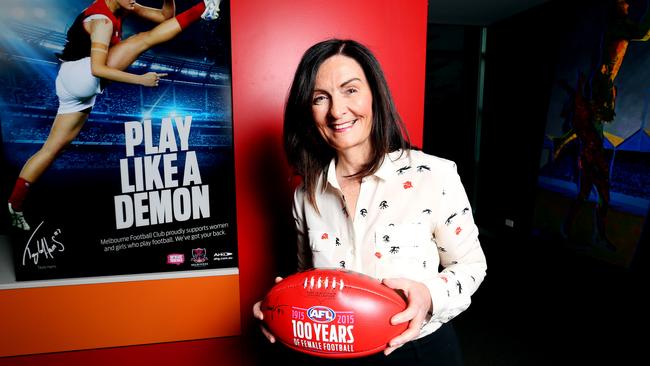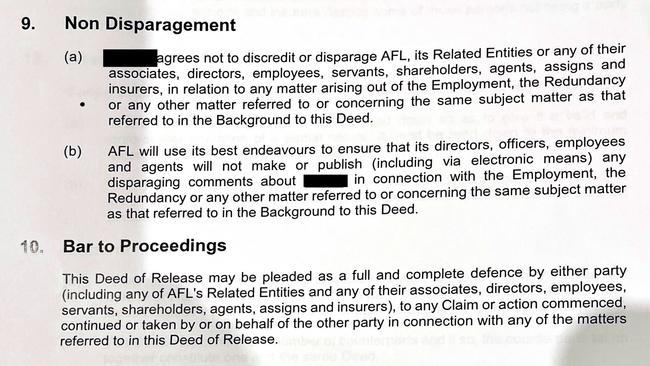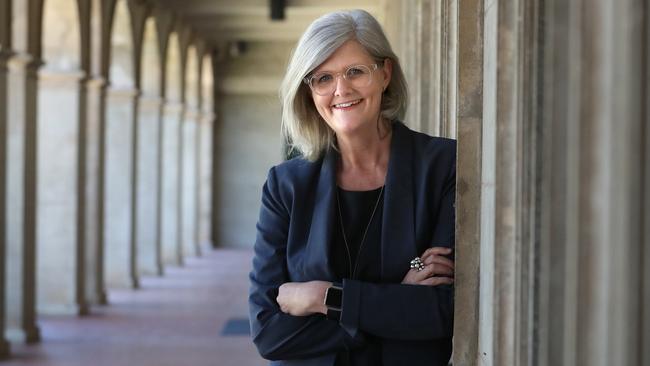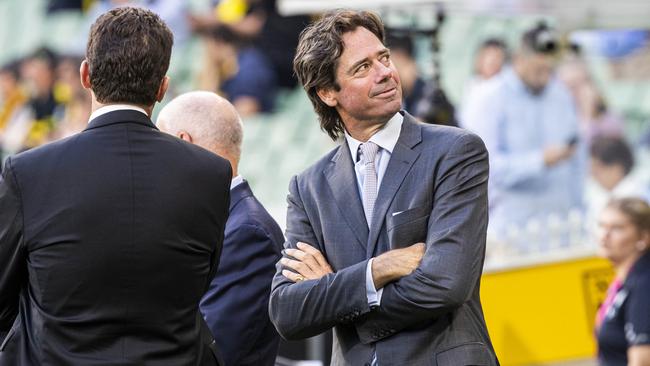Revealed: AFL uses payouts to hush women’s bullying claims
An investigation has exposed how the AFL systematically used payouts and confidentiality deals to prevent staff who complain of assault, sexual harassment or bullying from ‘disparaging’ the code.

AFL
Don't miss out on the headlines from AFL. Followed categories will be added to My News.
AFL House, state bodies and clubs have systematically used payouts and confidentiality agreements to prevent employees who complain of assault, sexual harassment or bullying from “disparaging” the billion-dollar code.
At least 14 employees – including one man – have left the AFL in the past nine years after complaining about bullying, poor behaviour or harassment, with 11 signing confidentiality agreements. Eight cases involved payouts totalling more than $760,000, with individual payments ranging from $17,000 to more than $200,000.
Four women — two of whom worked at AFL House, one at a state body and another at an AFL club — said they were left feeling “suicidal” after suffering bullying in their workplaces.
“I considered taking my life when I lost my job with the AFL,” said one woman who signed a confidentiality agreement for a $50,000 payout after alleging she was bullied.
“You think it is you that is the problem – but it’s not, it is the system and the structure.”
AFL chief executive Gillon McLachlan said in a statement the organisations had never used non-disclosure agreements to silence victims and he continued to proactively drive cultural change in his organisation.
“If there is a complaint or incident, it is taken seriously … during my time, under no circum¬stances has the AFL ignored or been dismissive of a formal complaint or tried to silence people,” he said.
“During my time as CEO, the AFL has never used non-disclosure agreements (NDAs) to try to silence victims or stop complainants from telling their story.
“Like all companies, it is standard practice for all people exiting the AFL via redundancy, termination or mutual separation to sign a Deed of Release that provides closure to all legal matters. This is not a barrier to people being able to share their experience and shouldn’t be.”

The Australian can reveal that in 2020, one woman employed by the AFL was asked to agree in writing to drop her bullying complaint – and “stop whingeing” – in return for an opportunity to work for a different manager. She never took her concerns to HR.
Of the 14 cases revealed today, 12 occurred during the past six years.
One of the AFL’s most powerful club presidents, Jeff Kennett, said he was shocked by The Australian’s revelations and demanded meaningful reform of the AFL, on behalf of all the complainants, and particularly the four women who revealed their suicidal feelings.
“If any of those women want to contact me, I will take it up with my fellow presidents to make sure that their circumstances never happen again,” Mr Kennett said.
“In other words, I can guarantee you I can get enough of the presidents together to make sure we bring about reforms that are necessary to change the culture so no woman or person at the AFL ever has to feel that perhaps as a result of treatment by the AFL, it is better not to be here.
“I have given 17 years of my life to BeyondBlue [as chairman], trying to assist those with anxiety and stress; what you are reporting is a lot more serious than that.
“I am prepared to help those people, bring about change, to make sure their circumstances are never repeated.”
In three instances, the men alleged to have been perpetrators abruptly resigned from the AFL after the complaints.
None of the complainants was ever told their allegations had been believed or that the men were sacked for misbehaviour.
The confidentiality agreements – sometimes presented in the form of a deed of release or a less formal written agreement – have included clauses in which both the employee and the AFL agree not to “discredit or disparage” one another.
Continuing damage
Two of the most influential women to have led the AFL – former AFL general manager of people, customer and community Dorothy Hisgrove and the game’s first female commissioner Sam Mostyn – today speak for the first time about the use of NDAs or confidentiality agreements and the importance of “zero tolerance” to harassment in the workplace.
“NDAs are used by employers across all sectors to manage reputational risk associated with poor workplace behaviours and also by complainants and respondents who prefer not to air the issue in public,” Ms Hisgrove said.
“The problem with confidentiality clauses in workplace NDAs is that they reinforce ‘nothing to see here’, with limited opportunity to conduct a proper review, learn from what’s happened and take action to remediate.
“Most importantly, NDAs present a very real risk of perpetrators potentially engaging in further harassment or bullying.
“The right for victims to tell their story is important and they are often denied the opportunity given the confidential nature of NDAs … in my experience, speaking with those who have done so, they regret, in retrospect, being party to consenting to nondisclosures. There has to be a better alternative to workplace NDAs as a great deal of damage is done in continuing the silence.”
Ms Mostyn, also the president of Chief Executive Women, reflected on a history of NDAs being generally used to protect organisations rather than complainants.
“I am terribly saddened to hear these women’s stories; I am disappointed to learn about the historical use of NDAs,” she said.
“As we learnt from (Sex Discrimination Commissioner) Kate Jenkins’s Respect@Work report, NDAs were widely used by many organisations, across many sectors, but often not reported to their boards and governing bodies. Likewise at the AFL, they were not reported to the commission.”
Managed out
The Australian has obtained evidence – including deeds of release, interviews, formal complaints, letters, internal AFL emails and a secret AFL dossier listing confidentiality deals — demonstrating a pattern where complainants are “managed out”.
The Australian’s investigation coincides with Wednesday’s release of a book by AFL journalist Michael Warner, The Boys’ Club, which reveals instances of infidelity, bullying and harassment within AFL House.
Mr Kennett called for an independent review into the AFL following Warner’s revelations. “This book shows the AFL has invariably come down on the side of the men,” he said. “And the women have become totally traumatised. As the book highlights, the AFL has become very much a law unto itself.”

Mr McLachlan maintains he is always trying to improve the code’s culture. “As CEO, I have always been and continue to be prepared to take clear and decisive action when inappropriate behaviour has been demonstrated.
“As an organisation, we have actively pursued a preventive approach to harassment and bullying through long-term cultural change. We have a safe, fair and respectful approach to complaints handling in which all parties have a right to a fair, impartial process.”
The Australian can reveal that in two instances, complainants’ positions were made redundant and they were offered financial settlements and required to sign documents with “non--disparagement” clauses.
‘Degraded, humiliated’
Non-disparagement clauses are a standard part of many settlement agreements, including redundancies, in which parties agree not to publicly denigrate one another in a general sense, but in several of the AFL agreements seen by The Australian, the non-disparagement clauses are unusually specific in forbidding disclosure of particular allegations of harassment or bullying.
One deed of release says the employee will not “discredit or disparage AFL, its related entities or any of their associates, directors, employees, servants … concerning the subject matter as referred to in the Background to this Deed”. The “background” was the woman’s detailed complaint to AFL Queensland about a campaign of bullying and harassment by her male boss, who resigned shortly after she and others raised allegations against him.
She was left feeling “degraded, humiliated, bullied and fearful” after being held in an office with her male boss yelling “I am the f..king (position deleted) and I decide what you do”.
She felt if she did not sign the deal offered to her and take a $60,000 payout, the AFL might “disparage” her. “It sickens me I was put into a situation whereby on one hand I wanted to get out of there … and on the other hand I can’t say anything,” she said.
“I technically couldn’t get support for what happened to me … couldn’t speak to work colleagues about the complaint, people who knew what was going on … and could understand what I went through. It created a secondary victimisation, whereby you knew you were the product of gossip but you couldn’t speak about it.”
The confidentiality deals date from 2012 under former AFL boss Andrew Demetriou, with most signed in Mr McLachlan’s tenure.
The Australian is not suggesting Mr Demetriou or Mr McLachlan engaged in the conduct complained of, only that the allegations were made during their tenures.

Deep depression
Warner’s book reveals a female staffer was sexually touched by a male manager at a 2017 work function when he “shoved his hand” up her skirt. “Fairly high. It would have been in line with … you know … you never forget where a creep touches you,” she told Warner.
Warner tells how human resources investigated and the attacker resigned before securing employment with another major sports organisation. Within a year of the assault, the man’s victim also left the AFL. “They [the AFL] don’t care about who they step on. That’s why they get everyone to sign a non-disclosure agreement on the way out,” she told Warner.
She told The Australian that once she fell out of favour with her bosses, they withdrew the “workplace flexibility” that meant she could care adequately for her child. “My request for flexibility was for parenting and was granted back when things were good, as per AFL policy,” she said. “After the bullying started, they retracted my parental flexibility rights and were forcing me to work full-time hours, ensuring I would fail. However, when I left, I had zero performance issues raised with me.”
The Australian has seen the assault victim’s “deed of release” which details a severance payment of $17,000 after tax. “I had to fight for that,” she said. “They first tried to make me work for four more weeks, knowing full well I would be left with nothing.”
In total, she was paid out $23,000 in December 2018. She struggled to find a permanent job and lost her rental home. She was left in deep depression, at times “suicidal”, and has been unable to hold a full-time job for more than a few months because of mental health issues she says she incurred at the AFL.
Need help? Call Lifeline on 13 11 14
Know more? jessica.halloran@news.com.au;harveyc@theaustralian.com.au
More Coverage
Originally published as Revealed: AFL uses payouts to hush women’s bullying claims




